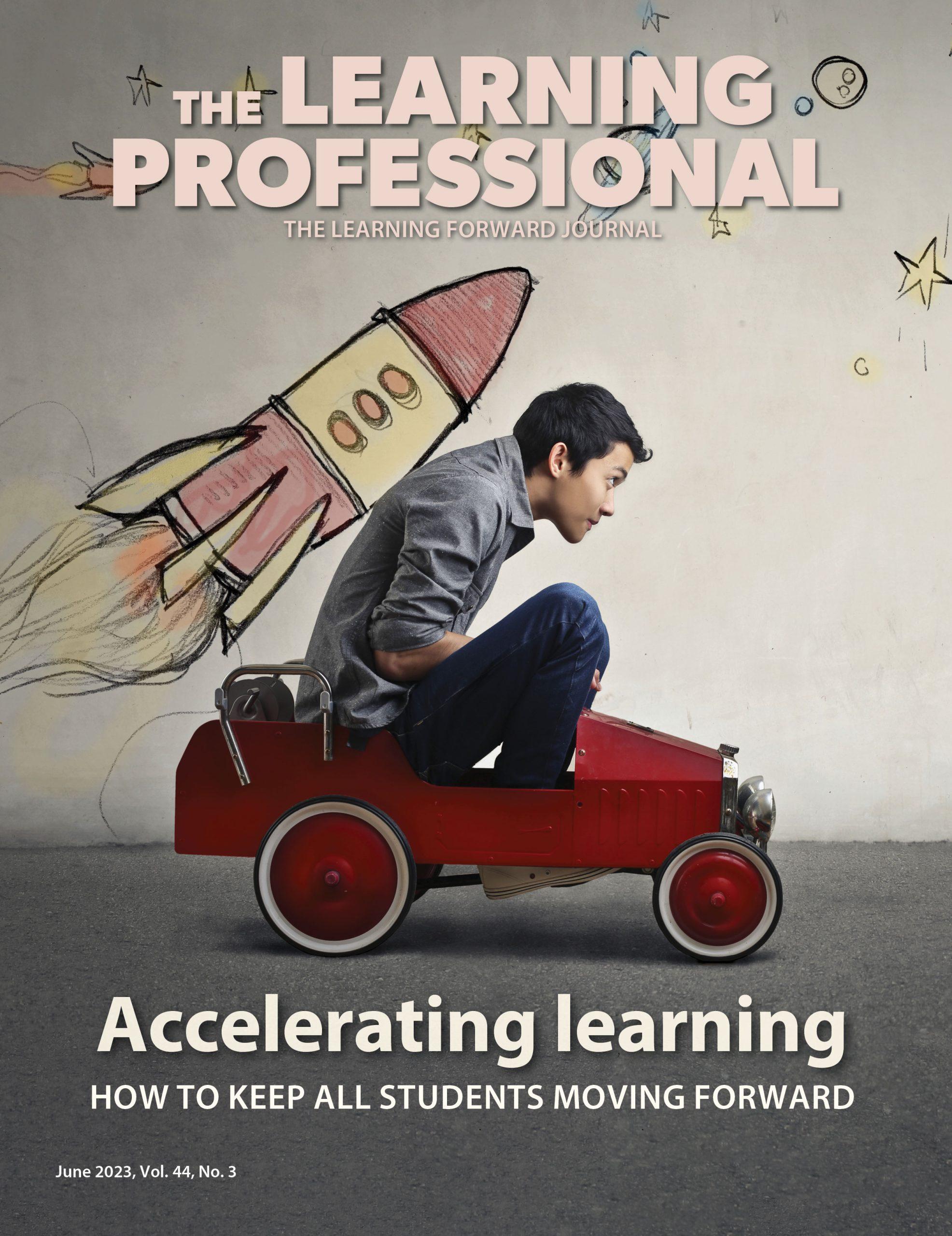FOCUS
ONLINE EXCLUSIVE: Mentors give new teachers a sense of belonging
By Andrea Thomas-Reynolds
Categories: Career pathways, Coaching, Mentoring & inductionAugust 2022
Being new in a job can be one of the loneliest times in a new teacher’s life. Research shows that feelings of isolation and a lack of collaborative relationships can push teachers to leave the profession altogether (Wheary et al., 2012; Brill & McCartney, 2008). This fact is accentuated by the realities of today’s educational landscape. The COVID-19 pandemic, remote learning, learning acceleration, parental activism, burnout, polarization around curriculum, staffing shortages, and exodus from the teaching profession are only a few examples of weight bearing down on an educator’s shoulders. In fact, a recent National Education Association study found that over half of teachers plan to leave education sooner than they had originally planned (Jotkoff, 2022).
While districts usually provide avenues of support, including coaching, mentoring, and professional learning communities, there is one additional essential support new teachers specifically need to be successful: feeling connected and supported by their fellow teachers. Effective teachers are more likely to remain in a district if they feel connected, have a sense of belonging, and are supported by their peers. To retain teachers, districts and schools must pay attention to new teachers’ social and emotional well-being by building cultures where connection and support are evident. One of the best ways to foster connection, support, and belonging for new teachers is through onboarding and mentorship programs.
Onboarding for new teachers helps them get acclimated and assimilated into the school culture, which can shape the culture of learning that schools want to build. Moving forward from the onboarding process, ongoing mentorship and support provide new teachers with a community focused on student achievement and growth. A collective focus on student results significantly increases teachers’ knowledge and skills. Conversely, limited social support hinders the sharing of knowledge with others. Yet more than 40% of districts do not provide teachers the opportunity to collaborate with other teachers when applying new learning (Prenger et al., 2017).
As the project director of Empowering Educators to Excel (E3) and Project IGNITE (U.S. Department of Education teacher and school leader grants), I have witnessed how onboarding and mentorship teams have served as a key lever in bridging the gap between recruitment and retention of new teachers. Both E3 and Project IGNITE are multiyear grants that provide support and growth opportunities for teachers and school leaders in school districts across the country by creating networked improvement communities.
I recently discussed the importance of this work with La Creasha Stille, assistant superintendent of curriculum and instruction at Gainesville Independent School District in Texas, and Janet Wallace, manager of teacher support and retention at Jackson Public Schools in Mississippi.
Both Stille and Wallace know that attracting and retaining great teachers requires prioritizing and developing a positive, relationship-focused culture — beginning with recruitment and lasting throughout a teacher’s career. With this common goal in mind, the approach in each district differed slightly due to their unique contexts and needs. Gainesville Independent School District, a small, rural district north of Dallas, focused on onboarding teams to foster a sense of belonging for new teachers’ first years and beyond. Jackson Public Schools, a large urban district, focused on mentorship teams to ensure that every new teacher can identify the one person in their school building to whom they can turn for support.
Stille and Wallace discussed with me their successes, challenges, and lessons learned in onboarding and mentoring while working in networked improvement communities, which provide a space for educators to come together, learn from one another through sharing and collaboration, and leave with new ideas to try in their own contexts (Brown, 2018).
How are onboarding teams and mentoring programs differentiated to teachers with different backgrounds, creating the conditions for each teacher to thrive in your district?
Stille: New teachers are exposed to content pertinent to their new teaching experience [through the New Teacher Academy]. The new teachers need a mentor that they can go to when they need something. They have seen more value out of having a mentor from their grade level and at their same conference period. They feel more supported when they can go to their mentor and not feel as if they are interrupting the mentor. Experienced teachers are able to grow from supporting a new teacher as well. They often forget what it feels like to be a new teacher — an experienced teacher can learn just as much from a new teacher as they can from another experienced teacher.
Wallace: Our goal [for the mentorship program] is that new teachers are able to identify the one person in the building who they can turn to for support. I think the goals of our program are [also] to provide a safe space for new teachers to strengthen their community with one another. We try to focus our monthly meetings on topics that aren’t necessarily addressed in a traditional teacher prep program or district-led professional learning. For example, we focus a lot of our support on emotional resilience and providing resources such as time management tools or the importance of self-care.
In addition to the focus on new teachers, experienced teachers who are new to the district are still able to call on the building mentor for support, whether it is lesson planning, SEL, or any activity related to the school. Professional learning on cultural competency and responsiveness is often incorporated into district-level support to ensure that the diverse needs of our scholars and teachers are met.
For our male educators of color, the IMPACT program is an initiative that is in its early stages and has seen a positive response. IMPACT stands for Inspiring Men to Positive Actions in our Communities Together. Each month, male educators of color are invited to a meeting in which topics are presented and participants can collaborate around solutions. There are also plans for an executive leadership cohort that will begin in September.
How have onboarding teams and new teacher mentoring brought about change and impact in your district?
Stille: Having onboarding teams is now viewed as a culture in our district. Teachers are happy to have the support. We discuss the onboarding process and New Teacher Academy during our virtual job fairs. We often hear the applicants state that they appreciate receiving the support that we speak of during the sessions. We have had a few attend our in-person job fair because of the amount of support we pledge to give our teachers, and they were drawn to the district because of it.
Wallace: The induction and mentoring programs have received recognition throughout the district from members of senior leadership. There has even been collaboration across departments in which teams are interested in starting their own. For example, the counseling department is planning to implement mentors for new counselors. The general interest in the program has increased and therefore allowed for more administrative support and buy-in.
What are the most important factors to successfully implementing onboarding teams and new teacher mentoring?
Stille: The most successful factor in implementing onboarding teams is finding people who are cheerleaders for the district and the campus. It must be a positive experience for everyone. The process is long because you want to keep the new employees connected from the moment they sign their contract. Finding individuals who know the town and the school district [is important]. For New Teacher Academy, mentors who are in the same grade level as the new teacher is of utmost importance. Mentors must see their position as a supportive one — you can’t leave your mentor without any direction if you want them to grow. During New Teacher Academy, it is [also] important to provide new teachers with the skills they will need to be successful in the classroom. The topics must be as timely as possible.
Wallace: The most important factor to successfully implementing onboarding teams and new teacher mentoring is to have a team that understands the importance from the retention side. New teacher support is crucial should districts hope to reduce attrition rates. There must be intentional and innovative planning around what support looks like from both the district and school level. The team should include the school-level administrator, the curriculum team, and the mentors when thinking about the needs of new teachers and who is responsible. Also, feedback from the new teacher is crucial. Teams should be monitoring progress and having discussions with the new teacher to ensure that support is relevant.
What challenges occur with implementing onboarding teams and new teacher mentoring? What have you learned from those challenges?
Stille: Challenges occur … when there is lack of communication from human resources regarding new hires. Principals will need to keep the onboarding team informed of their new hires. The challenges we face with new teacher mentoring stems from mentors not following through with the expectations. Next year, mentors [are scheduled to] meet more often and engage in more explicit professional learning.
Wallace: Often, the challenges that we are face are that the school-level administrator is not 100% on board with the goal of the induction and mentoring program. This leads to the potential of putting too much additional responsibility on the assigned mentor. We are still thinking of ways to address these concerns, [and] there have been many lessons learned throughout the development of our teacher mentoring program. The most immediate is that the program should include more planning and feedback from mentees. We are considering adding a small council of new teachers who can help guide our work towards ensuring that future teachers are supported consistently across the district. We are also in the process of developing more leadership pathways for mentors by appointing mentor captains who will be responsible for leading professional learning.
How can other schools or districts successfully and sustainably implement onboarding teams and new teacher mentoring structures and systems?
Stille: Once the onboarding teams and new teacher mentoring are implemented, it is important to follow up with both groups on a monthly basis. I believe that meeting with them monthly will keep them motivated, and you won’t find out a semester later that new teachers have not met with their mentor.
Wallace: There should be intentional thought behind how to support adult learners. Training needs to occur for all individuals who will be working closely with the induction and mentoring program. Ongoing progress monitoring should take place to ensure that the goals of the program are carried out. Also, districts should offer an incentive to the mentors who are spending additional hours with mentees outside of their regular duties.
Could you provide a specific example of how onboarding teams and new teacher mentoring has impacted teacher performance?
Stille: Our onboarding teams have helped our teachers feel a sense of belonging as they join the school teams. New teachers have reported that they felt more at ease and less overwhelmed because they felt as if they had a friend or friends once they arrived in the district. New teacher mentoring has supported their teaching and classroom management. Teachers state that they felt like they could ask questions and not feel judged since they were amongst other new teachers.
Wallace: Our mentors are experienced, successful, enthusiastic individuals who have added a tremendous amount of value to the program. They participate in monthly leadership development and go above and beyond to help their new teachers transition successfully into the career field. With a team that is committed to supporting one another, the program is growing in a positive direction.
A relationship-driven culture of support
Championing onboarding and mentorship teams as a means of connecting recruitment and retention has actively developed a relationship-driven culture of support in both Gainesville Independent School District and Jackson Public Schools. Despite their different contexts and needs, both districts have dedicated themselves to:
- Understanding how new teacher support is crucial to reducing attrition rates;
- Garnering administrative support and buy-in for onboarding and mentorship teams;
- Finding the people who are cheerleaders for their schools and districts;
- Ensuring there is intentional thought behind how to support adult learners and how to create a sense of belonging and community for new teachers;
- Providing regular professional learning or meetings for new teachers, onboarding teams, and mentors; and
- Including more planning and feedback from new teachers, professional learning for onboarding teams and mentors, and continuous progress monitoring.
Building a culture of belonging and connection for new teachers in schools does not just sit in one office. It is all-hands-on-deck, intentional, and year-round. I celebrate my colleagues’ successes, look forward to their ongoing progress, and hope their challenges and lessons learned can serve education leaders within their own contexts of supporting new teachers.
What new teachers are saying about the Jackson Public Schools mentorship program
“Having a mentor has been positive for me because I have someone who is there to assist me in every way. My mentor has provided necessary supplies for me when seeing that I was in need of basic items. She has given me advice on different methods to use when teaching certain skills and has also researched information to help students in centers.”
“Having a mentor has been beyond a positive experience for me because this is my first year teaching in a classroom setting. Therefore, there are so many things that I have had to adjust to, and having [a mentor] for support and advice has enabled me to continuously think outside the box. I will continue to grow knowing that I have [my mentor’s] support.”
References
Jotkoff, E. (2022). NEA survey: Massive staff shortages in schools leading to educator burnout; alarming number of educators indicating they plan to leave profession. National Education Association. www.nea.org/about-nea/media-center/press-releases/nea-survey-massive-staff-shortages-schools-leading-educator
Prenger, R., Poortman, C.L., & Handelzalts, A. (2017). Factors influencing teachers’ professional development in networked professional learning communities. Teaching and Teacher Education, 68, 77-90. DOI: 10.1016/j.tate.2017.08.014.
Wheary, J.W., Groome, M., & Rankin, J. (2012). Support. Collaborate. Retain: Strategies For improving the STEM teaching crisis. Dēmos; The New York Academy of Sciences. www.demos.org/research/support-collaborate-retain-strategies-improving-stem-teaching-crisis.
Categories: Career pathways, Coaching, Mentoring & induction
Recent Issues
TAKING THE NEXT STEP
December 2023
Professional learning can open up new roles and challenges and help...
REACHING ALL LEARNERS
October 2023
Both special education and general education teachers need support to help...
THE TIME DILEMMA
August 2023
Prioritizing professional learning time is an investment in educators and...
ACCELERATING LEARNING
June 2023
Acceleration aims to ensure all students overcome learning gaps to do...












